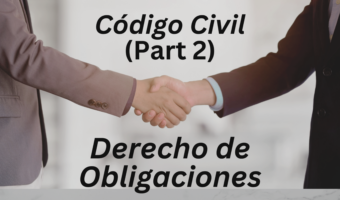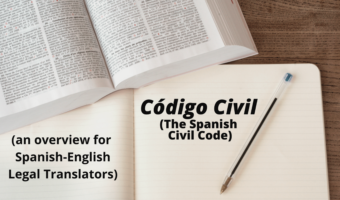Update for Russian Legal Translators and Court Interpreters By Dmitry Beschetny In early 2022, The ВLAWG published my article, “Translation by Interpreters and Interpreting by Translators,” in which I noted that, as a qualified translator, I could perform in Russian courts without needing a credentialed court interpreter status. At that time, Russian law did not […]
LawD Member Contribution
Things Legal Translators Need to Know: What’s in the Código Civil? (Part 2)
Part 2—Derecho de obligaciones By Rebecca Jowers A lawyer friend from the US once asked me, “Derecho de obligaciones, that’s the same as Derecho de contratos, right?” Well, although closely related, no, Derecho de obligaciones is a specific and rather extensive area of civil law, and Spanish law school students must generally complete the course […]
Things Legal Translators Need to Know: What’s in the Código Civil? (Part 1)
Part I—Derecho de la persona and Derecho de familia By Rebecca Jowers I’m a firm believer that legal translators and interpreters need to learn loads of law to be able to do our jobs properly. And if we have a firm grasp of the core concepts and terminology of the Civil Code, that’s half the […]
T&I for Indigenous Communities in Commercial Projects in Mexico
By Carlos Romero Mexican agrarian law provides that when indigenous communities[1] take part in a court proceeding, the agrarian court must assign, free of charge, a translator and interpreter who understands their culture and speaks their language so that they can explain the scope and consequences of said court proceeding.[2] Without a doubt, it is […]
Messenger Marketing for Freelance Translators: How to Leverage it Effectively
This material first appeared as an article in the newsletter of the ATA Translation Company Division, here, and published with permission from the ATA-TCD newsletter editor and the author. Thank you to Nora Favorov and Liv Bliss for their valuable contributions as editors of the article. By Dmitry Beschetny Introduction There are numerous ways to […]




